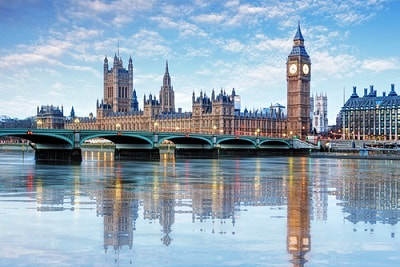Are you relocating to the United Kingdom? Prepare yourself for more than just castles and tea with our ultimate checklist for relocating to the United Kingdom.
The United Kingdom has long since been a popular destination for people looking for new beginnings. Its capital, London, is a truly global city with a wide array of opportunities for those looking for work, particularly in the financial services sector. The UK’s other major towns and cities all have sizeable ex-pat communities, while outside these the country’s more rural areas have varied and at times spectacular scenery.
If you’re planning to relocate yourself and your family to the UK, there are certain things you should be aware of before you leave, from immigration paperwork to how 2016’s Brexit vote could affect you. To help you out, here’s our checklist for moving to the United Kingdom, including information on the following topics:
- Do your research
- Arrange your visa
- Transport your belongings
- Manage your finances
- Move your vehicle
- Take care of your pet
- Sort out health insurance
- Find a place to live
- Start looking for a job
- Look into childcare and schooling options
- Brush up your language skills
Do Your Research
Many immigrants moving to the UK will have a good understanding of what life is like in the country before they arrive, thanks largely to its portrayal in popular culture. However, the reality of everyday life in the United Kingdom is likely to be different from what you see on the screen.
For example, the high number of opportunities in London is reflected in London’s high cost of living, but northern areas of the country are generally much more affordable. Similarly, while most large towns and cities have diverse populations and popular night-time economies, this is often not the case in more remote, rural locations.
Brexit and What It Means For You:
In June 2016, residents of the UK voted to leave the European Union. Once the UK leaves the EU, freedom of movement – both of EU citizens to the UK and of UK citizens to Europe is likely to end, along with many of the mutual benefits of membership enjoyed by citizens.
However, negotiations are still taking place and at this stage, the actual date has not yet been confirmed. In the interim period, the UK is still a member state of the EU and things remain as they were before the Brexit vote. The likelihood is that there will be a transitional period after the leave date (of at least two years) and that EU citizens currently with UK residence will retain their rights – although this has yet to be officially confirmed.
Arrange Your Visa
Are you familiar with the UK’s immigration requirements for you and your family? As the UK is currently an EU member state, EU/EFTA nationals can enter the UK without a visa and have the right to live in the UK if they are employed, self-employed, or registered as a job-seeker.
Certain other nationals can also enter and reside in the UK visa-free, or stay visa-free for six months. If you’re unsure, check online at the UK Government’s website to see whether you need a UK work permit. For more information on UK immigration, see our complete guide to UK residence permits.
Transport Your Belongings
How are you going to get your and your family’s belongings to the UK? It’s an important question, and the answer will vary depending on where you’re moving from. However, if you’re relocating with a family or simply want to take the stress out of your move, why not use a relocation specialist?
Relocation specialists can help you with every step of your move to the UK, from physically moving your treasured household belongings, to help you through the immigration process and even helping you find your child’s school. Whether you’re after the full door-to-door service, or simply some international shipping, check out these relocation services:
- Crown Relocations
- ReloAdvisor
- Sirelo
- The Relocator
Manage Your Finances
When moving to the United Kingdom, you must get your finances to ensure you can support yourself and your family. This relates to any short-term money needs as well as long-term financial management, including:
- Bank Accounts: Research your banking options before you arrive, including retail banks and mobile banking options in the UK. For more information, read our guide to opening a bank account in the UK.
Pensions, tax, and investments: Can your pension be transferred to the UK? How will your investments be affected? Find out before you move with our guide to the UK tax system and our guide to the UK pension system. - Insurance: Whatever your needs, make sure your family’s belongings have the protection they need by sorting out insurance premiums before you leave. For more information, read our guide to insurance in the UK.
To help cover your finances in the short term, you may also need to transfer money internationally quickly and easily. To do this, check out these international money transfer options:- CurrencyFair offers money transfers to over 150 countries and has exchange rates up to eight times cheaper than the banks, helping you avoid excessive bank fees.
- Moneycorp offers foreign exchange and global payment services to individual and corporate customers in over 120 currencies.
- Wise is an international money transfer provider. The service is available in 59 countries and offers transfers between cross-border bank accounts up to eight times cheaper than traditional banks.
You can also use Monito’s online comparison tool to save on fees, obtain the best exchange rates, and find the cheapest option for your international money transfers.
Move Your Vehicle
Are you planning on taking your car with you to your new home in the UK? One of the most obvious differences about UK motoring is that locals drive on the left, not the right like the majority of other European countries. But that’s not the only difference about driving in the UK, so make sure you do your research beforehand.
Take Care of Your Pet
Do you have a family of furry friends? Before you move to the UK, it is essential you know the requirements for importing pets. The United Kingdom has certain restrictions on the importation of pets and animals that you may not be used to, including quarantine laws. Therefore, you must prepare for the move well ahead of time. This will give you plenty of time to get all the required documents to avoid any delays or disappointment in the long run.
Sort Out Your Health Insurance
One of the most important things to do when moving to the United Kingdom is to make sure that you and your family have the right health coverage in place. The UK has a publicly-owned health service called the National Health Service (NHS), which is free at the point of service for all UK residents and EU/EFTA nationals with a European Health Insurance Card.
However, many ex-pats in the UK choose to take out health insurance instead. This can help protect you and your family from day one and ensure a quicker service than is often available on the NHS. Research your health insurance options ahead of time with one of these health insurance providers:
- Allianz Care
- Cigna Global
Find a Place to Live
The UK is a surprisingly varied country when it comes to finding somewhere to live. Do you want to move into a London townhouse? Or maybe a rural cottage somewhere in the Welsh mountains? Whatever you prefer, the UK has a range of housing options for all price brackets
Start Looking For a Job
Some ex-pats moving to the United Kingdom will already have a job offer lined up. However, many decide to go to the UK without any promise of employment, which means they’ll have to go job-hunting. The UK has plenty of job possibilities for ex-pats, although there are significant regional disparities in opportunities. For more information, read our guide to finding a job in the UK.
Look into Childcare and Schooling Options
Are you relocating to the UK with your kids? Give them the best start in their new life by researching educational options ahead of time. Generally speaking, the UK has good options for public and private education. So, wherever you move you’ll have a range of choices when it comes to schooling. For more information, read our guide to the UK education system.
Brush up Your Language Skills
Part of the UK’s attractiveness to ex-pats is the fact that English is the country’s official language. However, if you’re planning to work in the United Kingdom, you might want to consider improving your English skills. Whether you’re looking for conversational or business English, pick the course that’s right for you. If you’re planning to move to Wales, you might even want to learn Welsh, as well!
For more information on living in the UK, check out the UK Government’s official website, which has a range of important information for ex-pats and residents alike.







